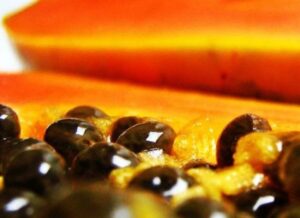5 Superfoods to Eat During Chemo

Chemotherapy, or chemo treatment, is both mentally and physically challenging for cancer patients and their caretakers. In order to keep your body in good shape through treatment, you need to eat a balanced diet. But with side effects like severe nausea and platelet breakdown, getting the right nutrients into your system can be difficult. These five foods can help ease your symptoms and rebuild your cells during chemo.
1. Papaya
High in vitamins C and E, rich in fiber and antioxidants, papaya is an excellent choice for its nutrients alone. Papaya helps increase your body’s platelet count, which can be diminished by chemotherapy. The leaves of the papaya tree significantly increase platelet count, according to a Malaysian study. And recent studies have found that papain, a proteolytic enzyme found in papaya, also can help in the treatment of some cancers. Papain stimulates immune cells to produce chemicals that destroy malignant cells. Clinical trials have shown reduced metastases and easing of side effects from chemo and radiation in patients who supplemented with papain.
Papaya can even cleanse and soothe your digestive tract. So, if you do develop significant nausea from chemo, try a slice of papaya to ease your symptoms.
2. Kefir
Kefir, a yogurt-like probiotic-rich drink, is a good choice since fluids and healthy bacteria are both important during chemo. Hydration is key since chemo can cause diarrhea and vomiting. And liquids are often easier to consume during chemo if you’re having trouble with solid foods. A nutrient-rich drink like a kefir shake is easy to get down and the healthy bacteria in kefir can help to settle your stomach. The probiotics in kefir are more varied than in yogurt. And, unlike yogurt bacteria, kefir bacteria colonizes the intestinal tract. The kefir bacteria stay in your system longer and, with more types of bacteria, can provide more benefits for a longer period of time.
Dairy provides protein for cell rebuilding as well as calcium and vitamin D. Muscle loss and malnutrition are common during cancer treatment and dairy can help your body rebuild itself. Pureed antioxidant-rich fruits also can be mixed into the kefir shake to add further benefits for treatment.
According to several studies, antioxidants influence response to chemotherapy and its side effects. Antioxidants can make chemo more effective against the cancer cells while eliminating or reducing the severity of chemo’s side effects of stomach upset and cell mutation.
The Mayo Clinic also recommends cold foods during chemo, since heated and room temperature foods can emit smells that may unsettle your stomach. Protein shakes, milkshakes and kefir shakes can pack in a lot of nutrients and calories with very little risk of stomach upset.
3. Brown rice
Making a simple switch from white rice to brown rice can make a big difference for chemo patients. Complex carbohydrates add nutrients and the extra fiber can help keep bowels regular. Instead of cooking your rice with all water, try using half liquid whey or lean chicken stock for extra calories. Brown rice on its own has 4.5 grams of protein, 1 mg of iron and 1.2 mg of zinc per cup. Protein, iron and zinc all increase your platelet count. Antioxidants also are prevalent in whole grains. And, when all other food seems unappetizing, plain brown rice can be the answer to your stomach’s tender woes.
4. Dried beans
Garbanzos, black beans and lentils are all mild, lean proteins that can be added easily to your meals or eaten as a snack. Protein malnutrition is common during chemo. Lean proteins provide amino acids that rebuild muscle and tissues that chemo has broken down. Beans are also high in iron and vitamin K, which can up your platelets.
5. Kale
Kale really is the new beef. It’s nutrient dense and sustainable. For chemo patients, kale’s benefits are even stronger. As with other leafy greens, it’s full of nutrients and antioxidants that can boost your system during chemo. Kale can help rebuild platelets and its antioxidants and nutrients can fight infections. It’s a rich source of immune-boosting carotenoid and flavonoid antioxidants including vitamins A and C. Kale’s high iron content can help with anemia and boost your platelets. It also contains more calcium than milk, so it can help rebuild your bone marrow. Kale is also high in fiber, which will help with potential constipation side effects of chemo.
Keep in touch with Kristi on Twitter @VeggieConverter
Image: luchilu

